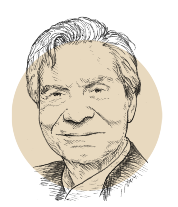I will begin with a personal reminiscence. In 1985, I was teaching economics at Stanford University in California. Occupying the office next to mine was none other than Milton Friedman, Nobel laureate, preeminent spokesman for economic libertarianism, and advisor to the then president Ronald Reagan. It was clear that my illustrious companion was avoiding me and would have preferred I were not there. Later we got along well, and Friedman confessed that he had taken me for a socialist, or even a communist, because I was French. The idea that a French person could be favorable to a market economy, as was my case, and be a follower of esteemed classical liberal ancestors such as Tocqueville, Frédéric Bastiat, or Bertrand de Jouvenel had initially not occurred to him. This is because, from the perspective of the United States, France is generally socialist and rather leftist. This is a positive for Democrats and a negative for Republicans.
How did France come by this reputation? In comparison with the social welfare institutions of the United States, it is quite true that French redistribution is socialist. Of all developed countries, France is the only one that redistributes 54% of national income in the name of equality and fraternity. There may still be some ultra-wealthy people in France, but they are few in number and only pay some tax. Often our social security system, which covers unemployment and retirement, is viewed with horror by Republicans and envied by Democrats.
Recently, an American economist who teaches at Cornell, Robert Frank, wrote in the New York Times how marvelous French social security was in comparison with its American counterpart. Having found himself the victim of a bicycle accident in Périgord while on vacation, he was transported to and cared for at a local hospital. To his amazement, he discovered that this service was free, and concluded that this was the model the United States should follow. In reality, it was I, a French taxpayer, who had paid for this unknown American friend. The French, on average, are obliged to pay a quarter of their incomes for their health insurance. On the other hand, French medical care is free, or to be more precise, it seems to be free because we all pay for it in advance. A well-known consequence of the high cost of social security is unemployment among less-skilled people, especially among young people. When social welfare taxes are added to salaries the cost is so high that employers are reluctant to recruit. In addition, unemployment benefits are comfortable enough to dissuade some of the unemployed from seeking employment. In the words of Pierre-Andre Chiappori, a French economist who teaches at Columbia in New York, the real difference between our two countries is that in the United States the poor work, whereas in France they do not.
Which is the better system? It is hard to answer this question definitively. In France, the cultural and political preference is more on the side of compensation for the unemployed; in the United States it is on the side of working if at all possible, with nuances dividing Republicans and Democrats, as is the case in France with the right and the left. In fact, all contemporary societies are founded on an implicit negotiation between efficiency and solidarity. Historically, the United States prefers efficiency and the French social justice. Alexis de Tocqueville wrote accurately, during America’s Jacksonian era, that the French loved equality above all else, and were prepared to sacrifice their freedom for it. The same cannot be said for the Americans.
There is therefore a certain hypocrisy or voluntary ignorance on the American side when Democrats champion the French model and when Republicans decry it. It would be more honest for the Democrats to admit that a social security system like the one in France would cost taxpayers a quarter of their incomes, and that full employment might suffer as a result. And it would be fair to ask the Republican camp to admit that economic growth and freedom alone do not suffice to create both wealth and a minimum of solidarity. The truth lies somewhere between the extremes of socialism and economic liberalism.
I will add two anecdotes that illustrate American bias toward the French, and vice versa. Milton Friedman was again surprised to learn that, despite its phenomenal taxes and its invasive bureaucracy, France in the end did not manage so badly. His explanation was the black market and fraud. Only a lack of respect for regulations, he thought, could explain France’s development despite the state. Perhaps, but there is more to it than that; it seems to me rather that French entrepreneurs succeed, not only by putting up with regulations, but also due to some extra efficiency, which is internationally recognized. But the French view of the United States is also biased. Most French people are persuaded that America is a wild west of capitalism. This view ignores American bureaucracy, the ferocity of the IRS, and the meddlesome bureaucracy of the City of New York and the State of California. Nicolas Sarkozy, while president, during a conference at Columbia, declared that in the United States you could “die in the street if you didn’t show your credit card to the paramedics.” But this ignores the effectiveness of American emergency services.
Whatever Sarkozy may think, this too is America. This reminds us how passionate the French-American relationship is, whatever the subject. There is love and hatred on both sides, without nuance and sometimes without understanding. But isn’t that the definition of passion?












